Telescope kits offer an exciting entry point into the world of astronomy for beginners. These all-in-one packages typically include a telescope, mount, eyepieces, and other essential accessories needed to start observing the night sky.
For those new to stargazing, a well-chosen telescope kit can provide a user-friendly introduction to celestial objects like planets, stars, and galaxies.
When selecting a telescope kit for beginners, it’s important to consider factors such as aperture size, focal length, and mount type.
Aperture, the diameter of the telescope’s main optical component, determines how much light the telescope can gather. A larger aperture allows for better views of faint objects.
Meanwhile, the focal length affects magnification and field of view, while the mount type impacts stability and ease of use.
We evaluated numerous telescope kits designed for beginners, focusing on those that offer a balance of quality optics, sturdy construction, and user-friendly features.
Our goal was to identify kits that provide clear views of celestial objects and make setup and operation straightforward for newcomers to astronomy.
Best Telescope Kits for Beginners
We’ve carefully selected the top telescope kits for those new to astronomy. Our list includes options that balance quality, ease of use, and value to help beginners start their stargazing journey on the right foot.
Gskyer 70mm Refractor
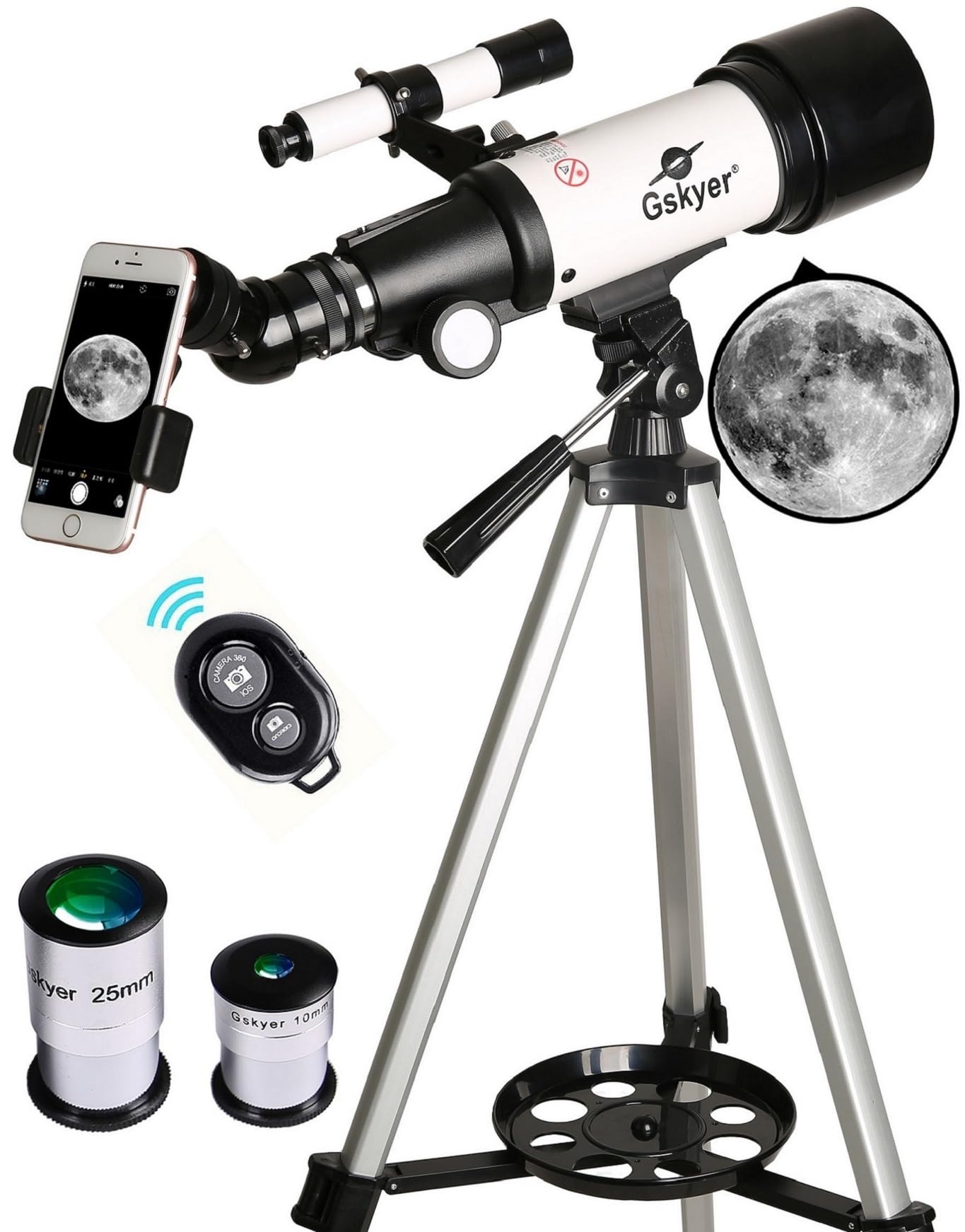
We recommend this telescope for beginners seeking an affordable entry point into stargazing.
Pros
- Easy setup and portability
- Smartphone adapter included
- Good optical quality for the price
Cons
- Limited aperture for deep-sky objects
- Plastic components feel fragile
- Finicky focus adjustment
The Gskyer 70mm refractor telescope offers a solid introduction to astronomy. We found its 400mm focal length provides clear views of the Moon’s craters and Jupiter’s bands.
Meanwhile, the included smartphone adapter lets us capture and share our celestial discoveries easily.
Setting up this telescope is straightforward, even for first-timers. The adjustable tripod allows for comfortable viewing, whether we’re seated or standing.
We appreciate the carry bag, which makes transporting the scope to dark-sky sites a breeze.
While the 70mm aperture limits views of faint deep-sky objects, it performs well for lunar and planetary observations.
The build quality is decent for the price point, though some plastic components feel less durable. Focusing can be tricky at times, requiring patience to achieve sharp images.
Despite these minor drawbacks, we find this Gskyer telescope offers good value for beginners eager to explore the night sky.
Celestron Travel Scope 70
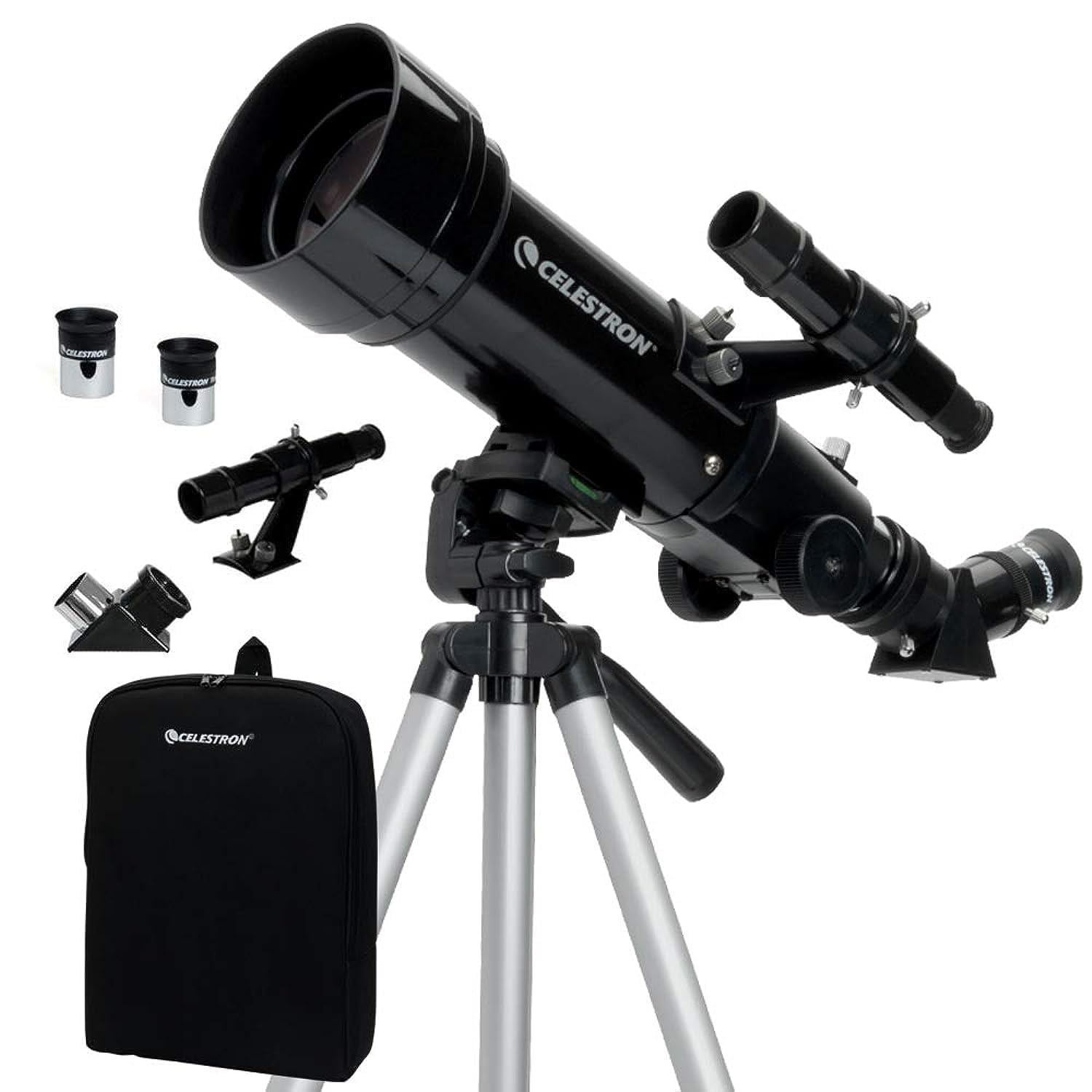
We recommend this portable telescope for beginners seeking an affordable entry into stargazing and daytime viewing.
Pros
- Lightweight and portable design
- Includes travel backpack
- Bonus astronomy software
Cons
- Limited high-power viewing
- Tripod can be wobbly
- Basic accessories
The Celestron Travel Scope 70 impressed us with its portability. Weighing just 3.3 pounds, we could easily carry it on hikes or to dark sky locations. The included backpack made transportation a breeze.
Setting up the telescope took mere minutes. We appreciated the no-tools-required assembly, perfect for quick stargazing sessions.
The 70mm objective lens provided bright, clear views of the Moon’s craters and some planetary details.
During daytime use, we enjoyed crisp terrestrial views. Birdwatching became a new favorite activity.
The two included eyepieces (20mm and 10mm) offered flexibility in magnification, though we found ourselves wanting more power for deep-sky objects.
HEXEUM 80mm Refractor Telescope
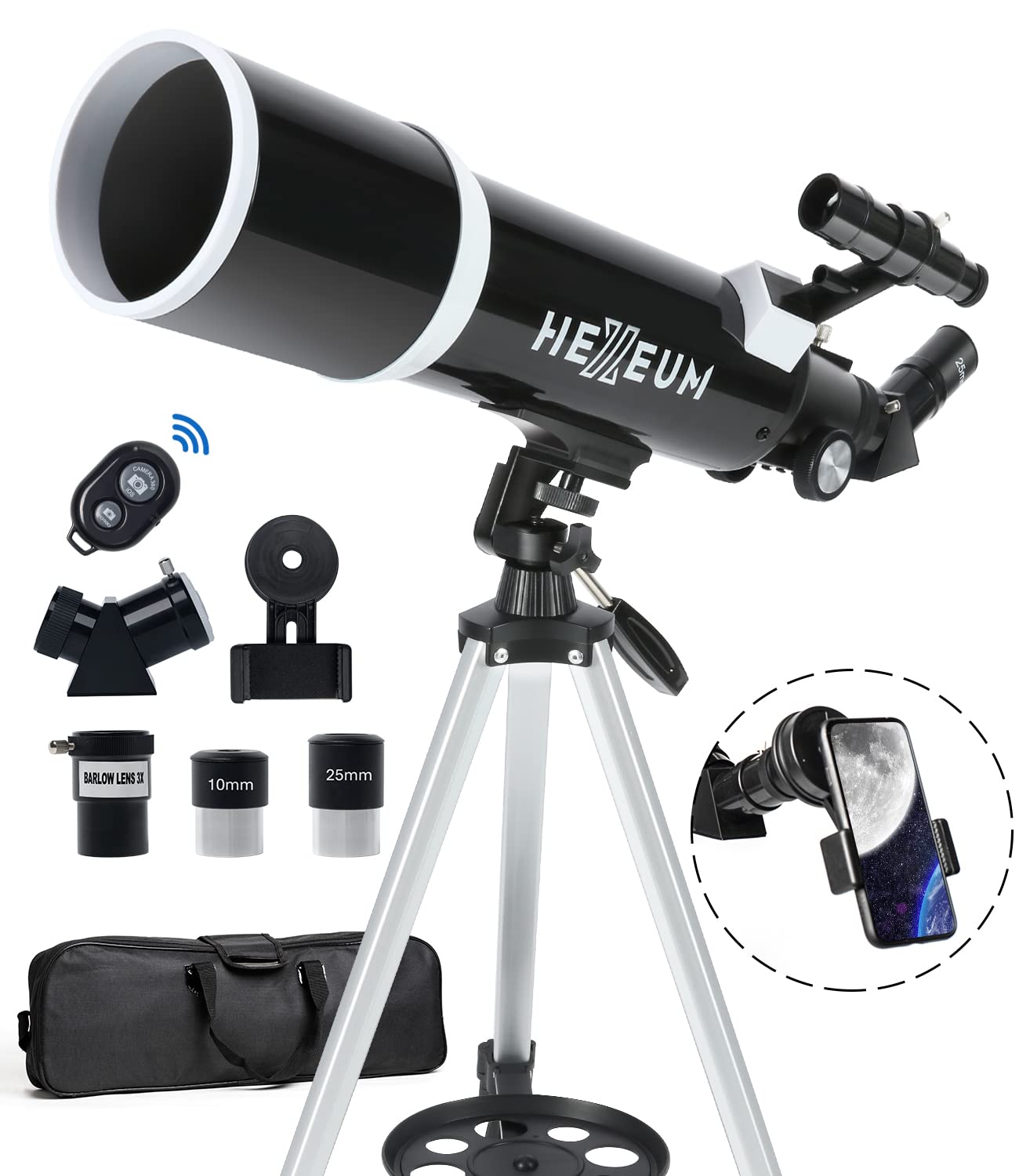
We recommend this telescope for beginners and casual stargazers seeking an affordable, user-friendly option for observing celestial objects.
Pros
- Easy setup and portable design
- Multiple eyepieces for versatile viewing
- Smartphone adapter included
Cons
- Tripod stability could be improved
- Limited for deep-sky observation
- Some users report focusing difficulties
The HEXEUM 80mm Refractor Telescope offers a solid entry point for aspiring astronomers. We found its 80mm aperture and 600mm focal length provide clear views of the Moon’s craters and Saturn’s rings.
Meanwhile, the included 25mm and 10mm eyepieces, along with the 3x Barlow lens, allow for a range of magnifications suitable for various celestial targets.
Setting up this telescope is a breeze. We appreciated the tool-free assembly, which gets you stargazing in minutes.
The wireless remote control is a nice touch, making it easier to adjust the telescope without introducing vibrations.
The included smartphone adapter lets us capture and share our astronomical discoveries, though it took some practice to align properly.
While using this telescope, we noticed the tripod could be sturdier. Some shakiness is present, especially at higher magnifications.
This isn’t a deal-breaker for beginners, but it’s worth considering. The optics perform well for lunar and planetary viewing, but don’t expect to see faint deep-sky objects in great detail.
Overall, we find this HEXEUM telescope offers good value for those starting their astronomical journey.
ToyerBee Beginner Telescope
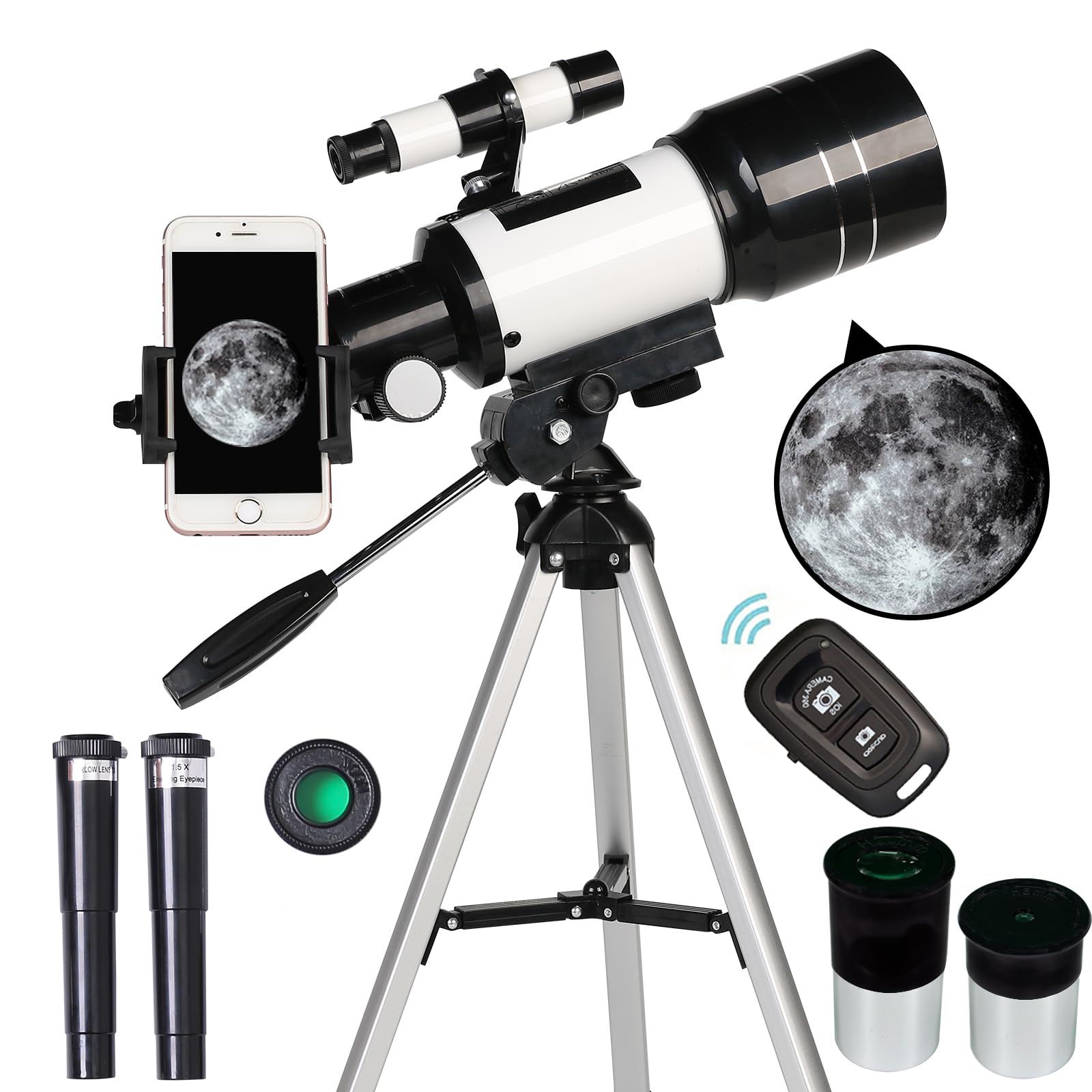
We recommend this telescope for kids and beginners looking to start their astronomical journey without breaking the bank.
Pros
- Easy setup and use
- Smartphone adapter included
- Wireless remote control
Cons
- Limited magnification range
- Plastic components
- Basic features for advanced users
The ToyerBee telescope offers an accessible entry point into stargazing. We found its 70mm aperture provides decent light-gathering ability, allowing us to see lunar craters and even Saturn’s rings on clear nights.
The included smartphone adapter and wireless remote are nice touches, making it easy to capture and share celestial images.
Setting up the telescope was a breeze. We appreciated the clear instructions and didn’t need any tools.
The altazimuth mount allowed for smooth tracking of celestial objects, though it took some practice to master.
For young astronomers, this user-friendly design is perfect for fostering interest in space exploration.
While the 15X to 150X magnification range is suitable for beginners, we did notice some limitations when trying to observe fainter deep-sky objects.
The plastic construction, while keeping the telescope lightweight and portable, may not stand up to rough handling. Advanced users might find the features basic, but for newcomers to astronomy, this ToyerBee model offers a solid starting point to explore the night sky.
Celestron 70mm Travel Scope DX
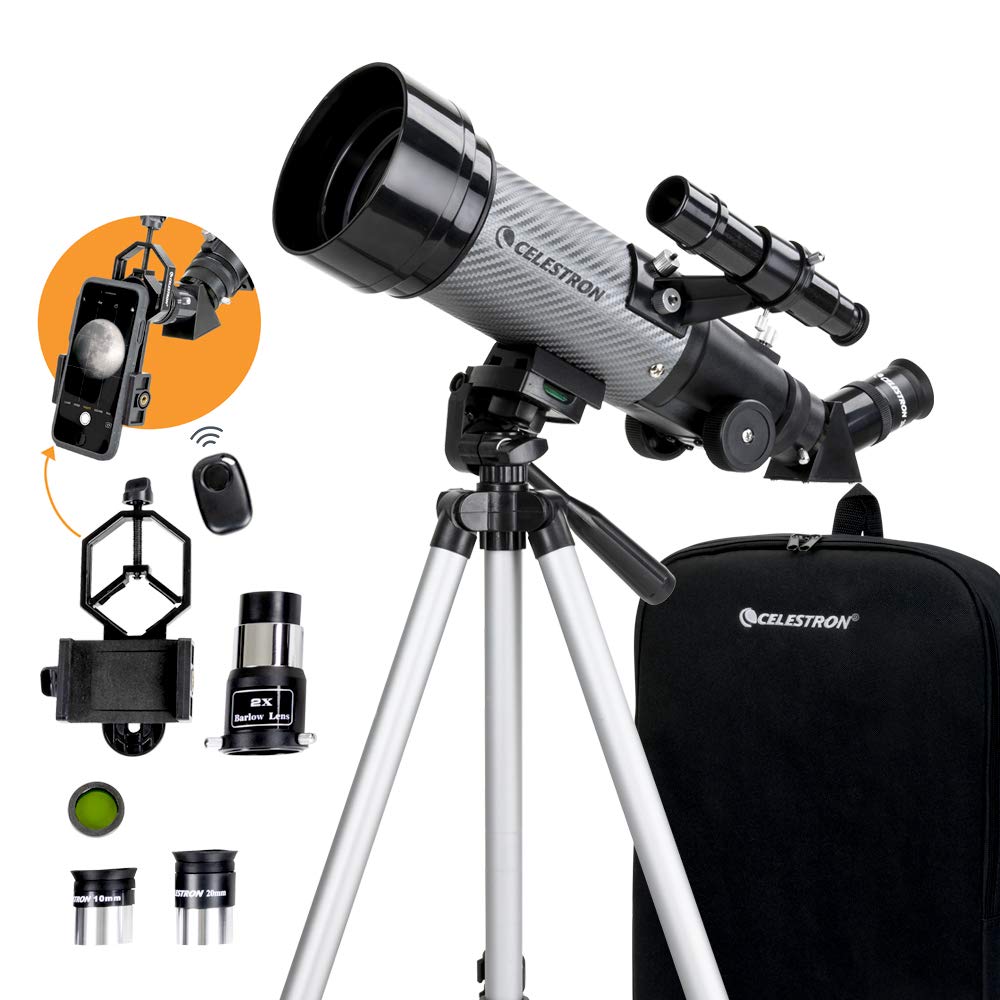
We recommend this telescope for beginners seeking a portable, versatile option with smartphone compatibility.
Pros
- Lightweight and portable design
- Includes smartphone adapter and Bluetooth shutter
- Comes with a custom backpack for easy transport
Cons
- Limited aperture for deep-sky viewing
- Tripod may be slightly unstable
- Manual focus can be challenging for novices
The Celestron 70mm Travel Scope DX impressed us with its portability and versatility. We found it easy to set up and take down, making it ideal for impromptu stargazing sessions or nature observations.
The included backpack is a nice touch, allowing us to carry everything securely.
During our testing, the fully-coated glass optics provided clear views of the Moon and brighter planets.
The 70mm objective lens gathered enough light for satisfactory celestial viewing, though it’s not ideal for faint deep-sky objects.
We appreciated the two included eyepieces, which allowed for both wide-field and closer views.
The smartphone adapter is a standout feature. We were able to capture decent photos of the Moon using our phones, which added an extra layer of enjoyment to our stargazing experience.
The Bluetooth shutter release came in handy, reducing camera shake when taking photos.
Buying Guide
When selecting a telescope kit for beginners, we recommend considering several key factors to ensure you get the best value and functionality.
Aperture
The aperture is crucial as it determines how much light the telescope can gather. Larger apertures allow for brighter and clearer images.
Focal Length
This affects magnification and field of view. Longer focal lengths provide higher magnification but a narrower field of view.
Mount Type
Choose between altazimuth (up-down, left-right movement) and equatorial (follows celestial objects) mounts based on your needs.
Portability
Consider the telescope’s weight and size if you plan to transport it frequently.
Included Accessories
Look for kits that offer essential accessories like eyepieces, finder scopes, and star charts.
Ease of Use
For beginners, user-friendly features like computerized mounts or smartphone compatibility can be beneficial.
Quality of Optics
Ensure the telescope uses high-quality lenses or mirrors for clear, sharp images.
Budget
Determine your budget beforehand, as prices can vary significantly between different telescope kits.
| Feature | Importance |
|---|---|
| Aperture | High |
| Mount Type | Medium |
| Portability | Medium |
| Accessories | Medium |
| Ease of Use | High |
Frequently Asked Questions
Choosing the right telescope as a beginner can feel overwhelming. We’ve compiled answers to some common questions to help guide your decision.
What features should I look for in a telescope as a beginner?
Beginners should prioritize ease of use and portability.
Look for telescopes with sturdy mounts, simple assembly, and clear instructions.
Computerized or “GoTo” mounts can be helpful for locating celestial objects.
Adjustable eyepieces and a finderscope are essential for comfortable viewing.
Consider included accessories like star charts or astronomy software to enhance your stargazing experience.
How important is aperture size when choosing a beginner’s telescope?
Aperture size is crucial as it determines how much light the telescope can gather.
Larger apertures allow you to see fainter objects and more detail.
For beginners, a 4 to 6-inch aperture is often sufficient.
It balances performance with portability and cost. As you progress, you may want to upgrade to larger apertures for deeper space observations.
Which type of telescope is best for beginners interested in planet observation?
Refractor telescopes are excellent for planetary observation. They provide sharp, high-contrast images ideal for viewing planets and the Moon.
A 3 to 4-inch refractor offers good views of Jupiter’s bands and Saturn’s rings.
Larger apertures will reveal more detail, but refractors become expensive in larger sizes.
Can you recommend a budget-friendly telescope for a beginner?
The Celestron AstroMaster 70AZ is an affordable option for beginners. It offers a 70mm aperture and an easy-to-use alt-azimuth mount.
Another budget-friendly choice is the Orion SpaceProbe II 76mm. This reflector telescope provides good views of the Moon, planets, and brighter deep-sky objects.
What are the pros and cons of refractor telescopes versus reflector telescopes for starters?
Refractor telescopes are low-maintenance and provide crisp images. They’re great for planetary and lunar viewing. However, they can be more expensive and heavier in larger sizes.
Reflector telescopes offer larger apertures at lower costs. They’re excellent for deep-sky objects. The main drawbacks are occasional need for alignment and potential for dust accumulation.
What are some reliable telescope brands for beginners to consider?
Celestron is known for quality optics and user-friendly designs. Their PowerSeeker and AstroMaster lines are popular among beginners.
Orion offers a wide range of telescopes suitable for various skill levels. Their StarBlast and SpaceProbe models are well-regarded starter options.
Meade produces reliable telescopes with innovative features. Their ETX series combines portability with advanced technology for beginners and intermediate users.





